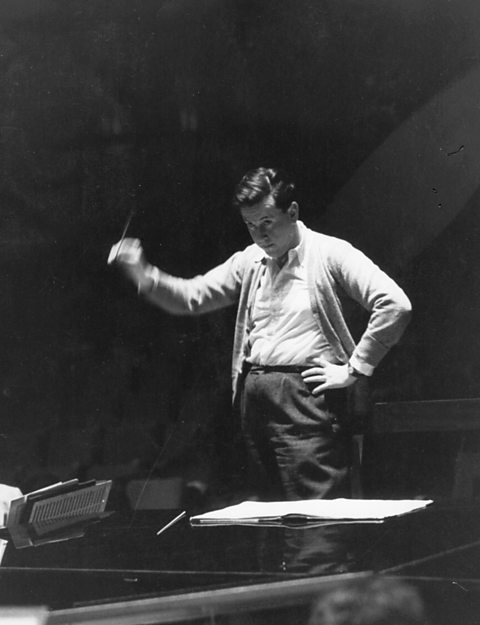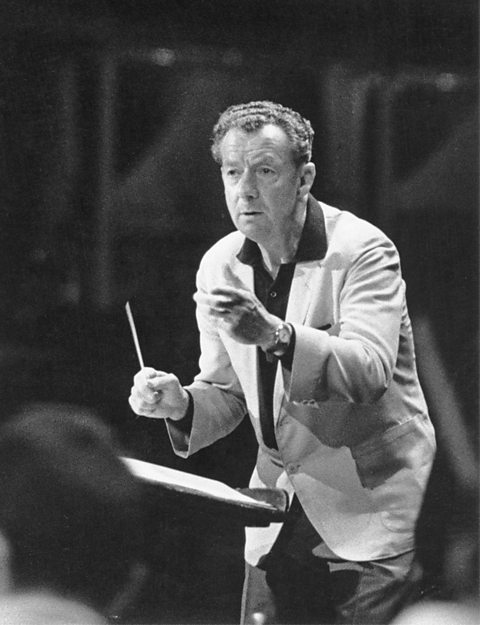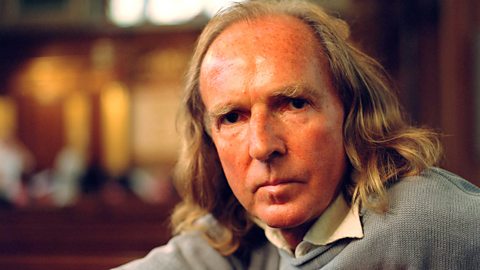20th century British composers
Malcolm Arnold
Arnold was born in Northampton in 1921. He was the principal trumpet player of the London Philharmonic Orchestra before focusing on composition. Arnold composed a wide variety of music and gained a reputation for writing film scoreSheet music that includes all the instrument and voice parts. and light music. He composed music for the first film series of the St Trinians and won an Academy Award for the 1957 film The Bridge on the River Kwai.

Arnold composed suites of English, Welsh, Scottish and Irish dances. He wrote a great deal of chamber musicMusic written for a small ensemble. including pieces for wind and brass quintetMusic written for five players. as well as works for brass band and concert band. His influences include works by late Romantic period1825 - 1900. and early 20th century 1901-2000. composers such as Sibelius, Berlioz and Mahler as well as the jazzA genre of music that has swing and syncopated rhythms, and extended chords. genre.
Peter Maxwell Davies

Born in 1934, Davies wrote music in a wide variety of styles and explored medieval and Renaissance techniques, such as plainsongA type of religious chanting that features in Western church music. and chant. He was also influenced by serialismA composing method using a series of notes in a particular order. and expressionismA style of painting, music, or drama in which the artist or writer seeks to express emotion or inner feelings rather than external reality.. He moved to Orkney in the 1970s and his music demonstrated Scottish influences such as the pieces Orkney Wedding, with Sunrise and Farewell to Stromness. He composed ten symphony A long composition for the orchestra, typically featuring four movements. and a number of quartetMusic written for four players., concertoA piece for an orchestra with a soloist, in three movements and vocal works.
Benjamin Britten

Britten was from Suffolk and born in 1913. He composed music for a wide range of ensembleA group of instruments playing together. and is highly regarded for his contribution to orchestral and vocal music. One of his most famous orchestral works is The Young Person’s Guide to the Orchestra, which is based off a theme by Henry Purcell – a composer from the Baroque period1600 - 1750. . Britten’s piece is a fugueA musical form in which parts enter one after the other with the main theme or subject. These build to create a complex contrapuntal texture. and is frequently used to teach children about the instruments and families of the orchestra. Peter Grimes and War Requiem are regarded as Britten’s most famous operatic and choral works respectively.
John Tavener

Tavener was born in London in 1934. His music had many religious influences and he was best known for his religious vocal works. Tavener’s conversion to the Russian Orthodox church in 1977 also inspired some of his later compositions. He achieved early success with his cantataA vocal composition with an instrumental accompaniment, which the church congregation could join in with. The Whale, which tells the story of Jonah and the whale. His Song for Athene, featuring a SATBSoprano, Alto, Tenor and Bass. choir, was performed at the funeral of Princess Diana in 1997. A number of his choral works such as The Lamb are settings of poems by William Blake. His instrumental works include The Protecting Veil, which was written for cello and strings.